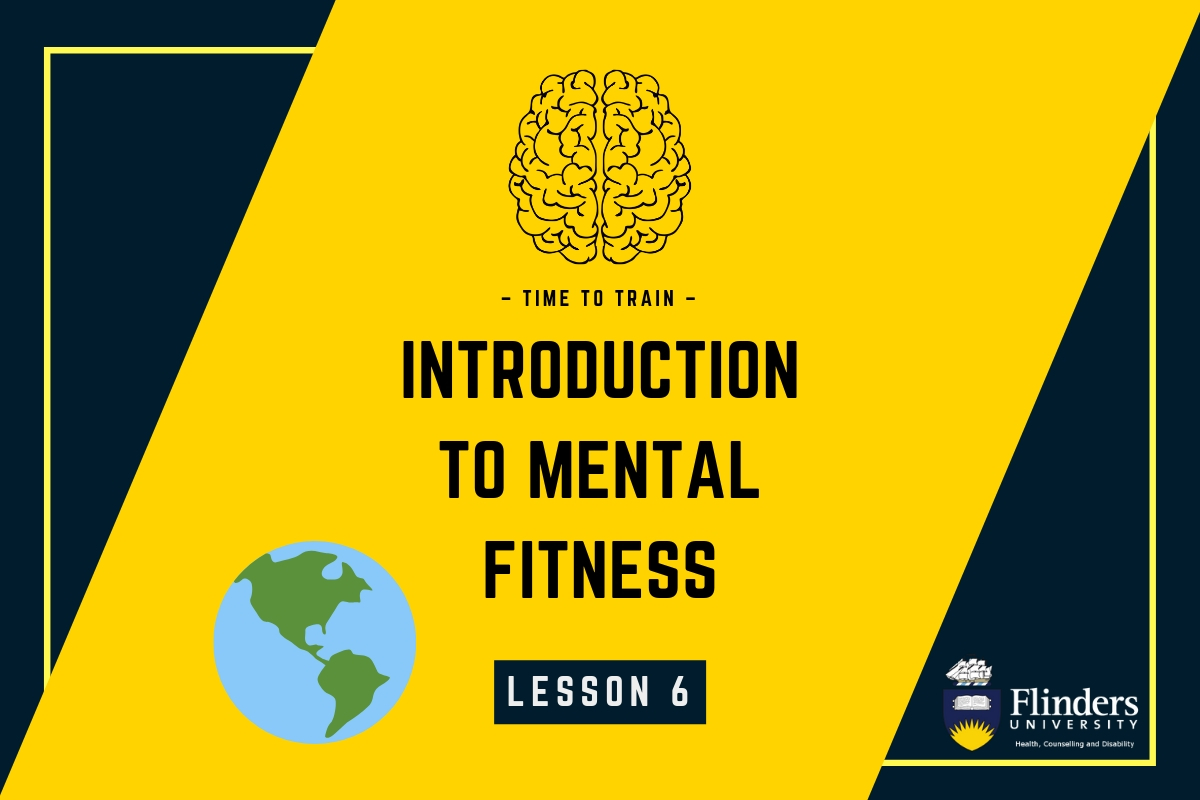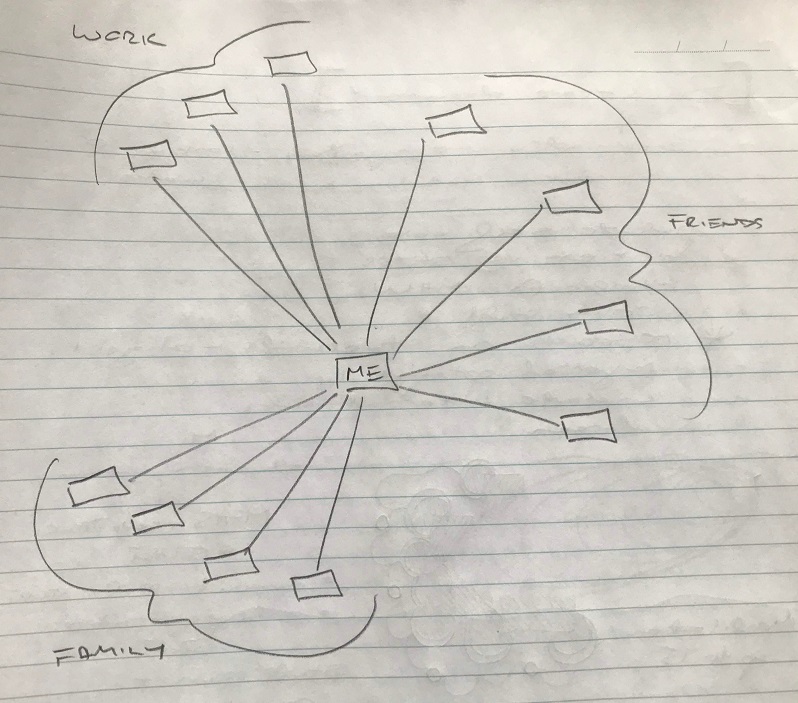
Greetings and welcome to Lesson 6 of my ‘Introduction to Mental Fitness’ course. If you are new to the course, check out the introductory post first.
Welcome to Lesson 6 of the Introduction to Mental Fitness Course.
I contemplated calling this lesson “Think Global, Act Local” but that seemed a bit obscure. Instead I went with the slightly more confronting “Why the world needs you to self-improve“.
This lesson is the last in a small sub-series of lessons I have been writing on the motivators for self-improvement. Lesson 2 looked at why self-improvement should be a deliberate activity, not something we leave to fate. Lesson 3 explored common everyday reasons why people make improvements in their life. Lesson 4 looked at how a vision of future better version of yourself can motivate you in the present moment. Finally Lesson 5 looked at psychological needs as a guiding force in motivating you to improve but also identifying which aspects of your life to improve.
In this final lesson on self-improvement (before we start digging in on mental fitness itself), I encourage you to think about the people around you, your community, your state, your country and even the world when thinking about why you should make improvements to yourself. So let’s get started.
Think Global, Act Local
I first heard this phrase in relation to household recycling. The basic idea is that environmental health (e.g. global warming) is a global issue, but you can play your part in improving environmental health by your behaviour at home, that is, getting better at recycling. If enough individuals assume responsibility in this way, then us as a collective moves towards a solution.
I believe the same idea holds when it comes to mental health and wellbeing.
Mental health is definitely a global issue. For example, depression is the leading cause of disability worldwide.
It is impossible for any single indivdual to cure an international problem, but you can act locally in terms of your own mental health. That is what this course is about – what you can do as an individual to build mental fitness and reduce your risk or reduce the impact of mental ill health. If enough individuals make these types of important improvements, then we move as a collective towards better mental health.
Supporting that process is the finding that emotions can be contagious. What you do at the individual level in terms of your thoughts and feelings and behaviours can ripple through the networks of people that you interact with. This works for positive and negative emotions. So attempts on your part to improve your emotional capacity, can have similar positive impacts on your peers and family.
Given this potential avenue for influence of the people around you, what might motivate you to work on your own mental health/fitness with your peers and community in mind?

The moral perspective
1 in 5 Australians aged 16-85 experience a mental illness in any given year. Almost 50% will experience a mental illness in their lifetime.
This constitutes a pretty big amount of suffering!
Some of these illnesses are not preventable, being the result of genetic or social/environmental factors that are difficult to modify.
However many are preventable, or at least could be reduced in severity through individuals improving their self-care and/or reaching out for professional assistance.
Preventing needless suffering seems like a worthwhile moral stance to take and one imbued with significant meaning. If you can act as a role model to those in your immediate networks in terms of how you look after your mental health and have this translate to less suffering in that network, that sounds like a powerful source of meaning in your own life.
This is at least partly a driver for me in building and distributing this mental fitness course – the hope that we might together be able to reduce the number of members of the Flinders community suffering.
The economic perspective
Mental ill health doesn’t just lead to suffering. It leads to a loss in productivity.
Individuals who are struggling with their mental health take more sick days, have poorer on-the-job productivity or are more likely to be unemployed or only partially employed. They also use more health services.
This negatively affects their personal financial status which has flow-on effects for their living standards, physical wellbeing and social connectedness, but also the financial status of the economy as a whole.
Research from Deakin university suggested that just depression, anxiety and substance-use cost the economy $12.8 billion dollars per year – “$974 million in health care costs and $11.8 billion in total productivity loss. Additional costs to governments included $1.23 billion in forgone income taxes and $12.9 billion in welfare benefits.”
This is like a double whammy effect on the economy – more people are suffering and then more money has to be diverted from other causes to spend on that suffering.
So if the prosperity of our country is of concern to you, then acting in your own life to reduce the impact of mental ill health on your productivity is a valid starting point.
The inter-generational perspective
Mental ill health is transferred through generations by both genetic and environmental factors. Kids inherit the same genes, and often many of the same beliefs/behaviours as their guardians. Kids also encounter a wide range of teachers and other adults in their formative years. They absorb the ideas and attitudes of those people.
Our behaviour as a generation also influences those that come after us. We leave behind systems and social norms and organisations and debt that can either promote the health of subsequent generations or harm it.
In many ways my generation (Gen X) has done a reasonably decent job of improving the public conversation around mental health. We’ve reduced stigma around mental illness and seeking help. We still have a lot to do though – particularly in pooling the wisdom of previous generations and combining with current understanding of mental health to give better guidance on what constitutes a mentally healthy life.
If you are a parent, or grandparent or auntie/uncle or work in a role where you have exposure to subsequent generations, there is an opportunity for you to be a role model in terms of how an individual thinks and behaves in relation to mental health. Your efforts at looking after your own mental health will influence how those in the next generation look after theirs.
The existential perspective
Humans face a number of challenging existential risks (risks that have the potential to cause human extinction). These include artificial intelligence, nuclear war, bioterrorism, pandemics, and global warming. Many of these are potentially caused by us.
Amerlioration of these risks requires clear rational thinking and extensive human collaboration. It will require us to work across borders, across religions, across race to generate global solutions. It will require us to put aside differences in personal philosophies to find common points of connection.
Will you getting an extra hour of sleep per night to study better have a measurable impact on these risks? – Probably not. But expanding your mind through reading or podcasts, will help you take different perspectives and increase your capacity to work and interact with people outside of your immediate network. Clarifying your own personal philosophy might increase your acceptance of others. Learning a new language can shift how you construct the world. There are many things you can do that improve your mental health, that also set you up to be a more global citizen.
Final thoughts
There is something a little weird about thinking of the collective benefits of each individual focusing on themselves.
Wouldn’t it just create a whole society of selfish individuals?
On the surface that may seem like the case, but I am constantly struck by the observation that those who push themselves to be better end up having a positive impact on the people around them. This might be:
- because they are a source of inspiration or instruction to others;
- because in the process of improving themselves/meeting their own needs they become focused also on helping others (recognise that others have similar needs)
- because they build businesses or organisations that provide employment to 10’s or 100’s or 1000’s of people
- because they have a direct role in educating and raising the next generation
- because they discover that their own improvement is a micro-metaphor for the improvement of us all
- because they are happier and more enjoyable to be around
- because their success frees up time to spend with their family and friends
Even those who are incredibly vain, still seem to end up going on a personal journey that ends up being positively informative to others.
So if you are questioning whether or not focusing additional time on your own mental fitness is selfish, I encourage you to think about the many ways that your behaviour might positively influence those around you. Deciding that you are worth the effort, carries with it the realisation that everyone is worth the effort.
In the next Lesson, we leave behind all this talk about the motivation for self-improvement and actually start digging into the concept of mental fitness itself…..
Reflection Questions
I want you to consider this idea that focusing on yourself and your own self-improvement might have a positive ripple effect through your network. Does this make sense to you? Do you agree or disagree with the idea? If yes, in what ways might you making positive changes in your own life, impact beneficially on those around you.
Suggested Tasks
If you’ve been following along with the suggested tasks of previous lessons, then you’ll have a notebook or electronic document in which you are completing these tasks.
In that notebook/document, under “Motivation” I want you to draw a map of the key people that you have contact with on a daily or weekly basis. You can group them into family/ friends/ colleagues/ peers etc.
Something like this:

I then want you to reflect on what you’ve learned or observed from that person about how to look after one’s mental health. What has that relationship taught you about how to look after yourself?
Write keywords on the line between you and that person.
Looking at the impact that other people have had on the way you look after yourself, can you also see what influence you might have had on them? This is a first step in considering what kinds of positive health/mental health impacts you might be able to have on your immediate social networks. Write those keywords on the line between you and the person.

